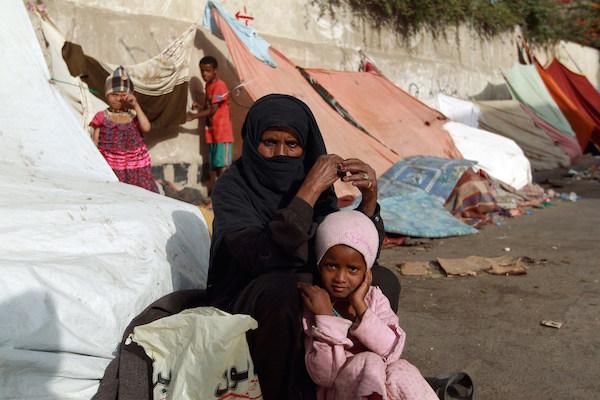Somalis used to flee to Yemen to escape war. Now it’s the other way around
Families from the northern Yemeni city of Amran, 50 kilometers north of Sanaa, take refugee in the capital, on July 13, 2014 after fleeing their home as battles between the Yemeni army and Shiite Muslim rebels intensifies.
BERBERA, Somalia — As Adra Sarraf held a crying baby outside a makeshift refugee camp in the Gulf of Aden, she wondered whether she and her four children would lose their lives to hunger, or terror.
“We’ve no food to eat here,” said the 33-year-old mother of four. “My children have been surviving on water for the last two weeks.”
Around 100,000 people have fled the civil war that erupted in Yemen in late March. Sarraf is one of the 28,000 Yemeni refugees who crossed the gulf and settled in Somalia.
Her journey was dangerous, and painfully ironic: For years, Somalis fled to Yemen to escape civil war and terrorism — almost 240,000 of them, according to United Nations figures. Now Yemenis are looking for a safe haven in Somalia.
But fleeing to the Horn of Africa does not guarantee safety. The Al Qaeda-linked Somali terror group Al Shabaab is increasingly active in northern Somalia, as the central government in Mogadishu and African Union forces have racked up victories against the Islamic militant group in the south.
Last month, authorities in Somaliland — a region that has declared independence from Mogadishu — apprehended five suspected Al Shabaab fighters on a bus traveling from Berbera to Hargeisa, the Somaliland capital.
“We also fear for our lives because of insecurity,” Sarraf said. “This is the kind of crisis we thought we left in Yemen.”
The civil war between Shiite Houthi rebels and the Yemeni government has left more than 4,000 dead. The Saudi government and other Sunni Arab countries have been bombing Houthi positions in a bid to stop Iran — which it says backs the Houthis — from gaining a foothold in the region.
Sarraf lost her husband in the fighting. She trekked with her children for several days from the Yemeni capital of Sanaa to the coast, where she used her last remaining cash to pay for a speedboat to take her to Berbera in April.
“We are happy because we survived,” she said. “I could hear sounds of airstrikes and bombings. We passed by dead bodies and helpless people who were injured.”
Life in Somalia, which has few resources to accommodate the refugees, is not easy. But it’s better than Yemen, she said.
“It’s hell here because we’ll starve and finally die,” said Sarraf. “But in Yemen the bullet will kill you within a second. So we prefer being in Somalia than Yemen, because we hope that aid workers might come to our rescue before we die.”
Humanitarian groups are struggling to assist the refugees, but the flood of people is overwhelming, especially since many Somalis, too, are now returning home to escape Yemen's war.
More from GlobalPost: Mogadishu used to be hell. Now it's coming back to life
Somali Foreign Minister Abdisalam Hadliye Omar recently said the government was working with the UN to ensure Somalis still trapped in Yemen returned home. Planes carrying Somali nationals evacuated from Yemen have been landing in the Mogadishu airport in recent months.
"More heIp is needed to ensure basic services and livelihoods and strengthen registration and verification and reception capacity at the main ports, particularly as outflows of Somali nationals are expected to continue," said UN refugee agency spokesman Adrian Edwards in a statement.
Abubakar Dahir, a 42-year-old Somali, was stranded in Yemen with his family before he was evacuated by his government. He said the violence was worsening in Sanaa.
“People were being killed every day,” he said. “There was [a] series of bombings during day and night. We lived in fear until we were rescued by our government.”
Dahir, a father of three, was shocked at how the tables had turned between Yemen and Somalia.
“When all my parents were killed in 1997, I had no option but to escape to a neighboring country,” he said. “Life had been good in Yemen before the war started. I had my own hotel business but the place was destroyed by airstrikes.”
Dahir said he was willing to start a new life in Somalia if the government took care of his family’s security and helped him start a new business.
“Somalia is still not safe,” he said. “But it’s safer than Yemen right now. I will settle here and hope that the government will give us support to start new life.”
